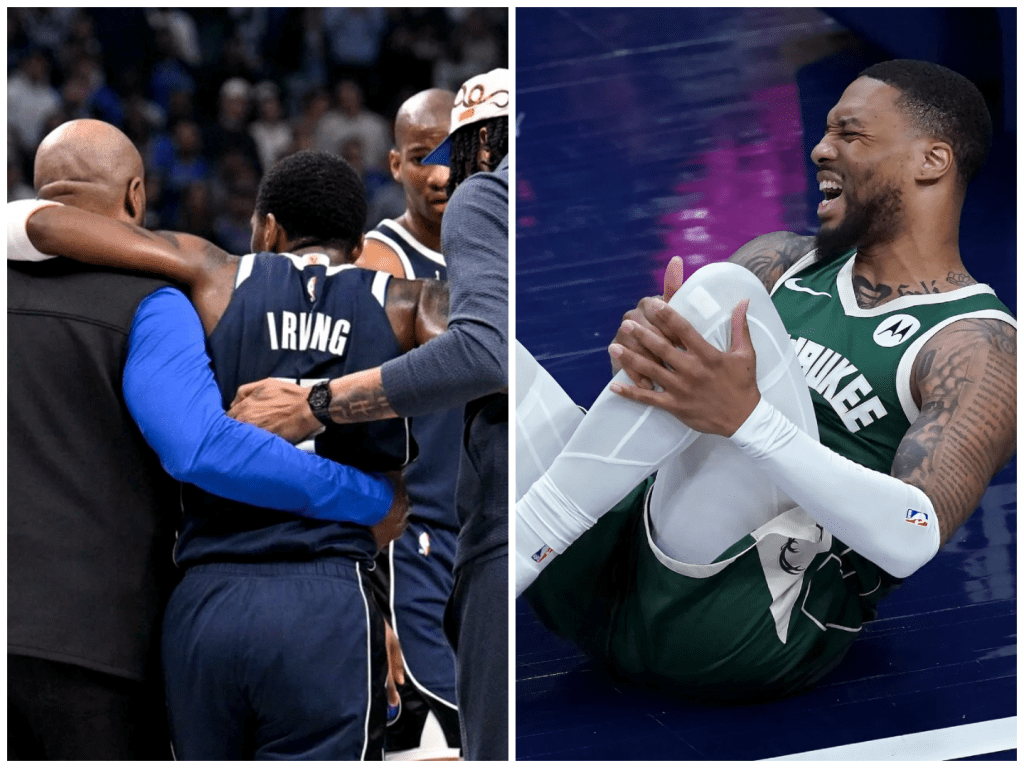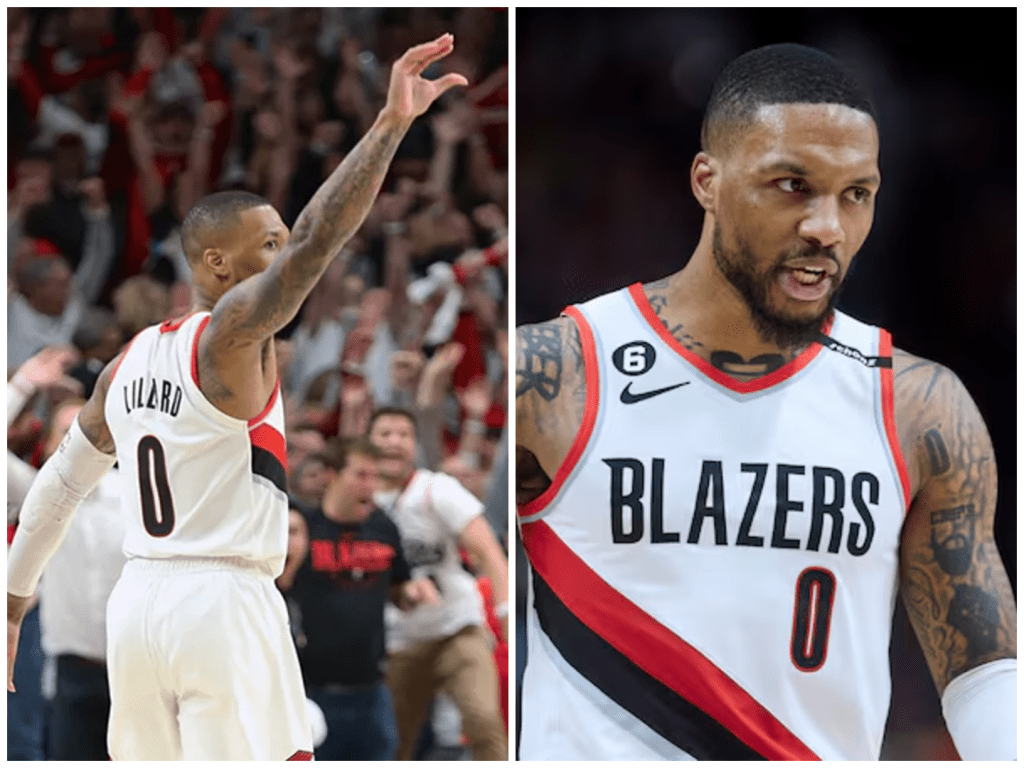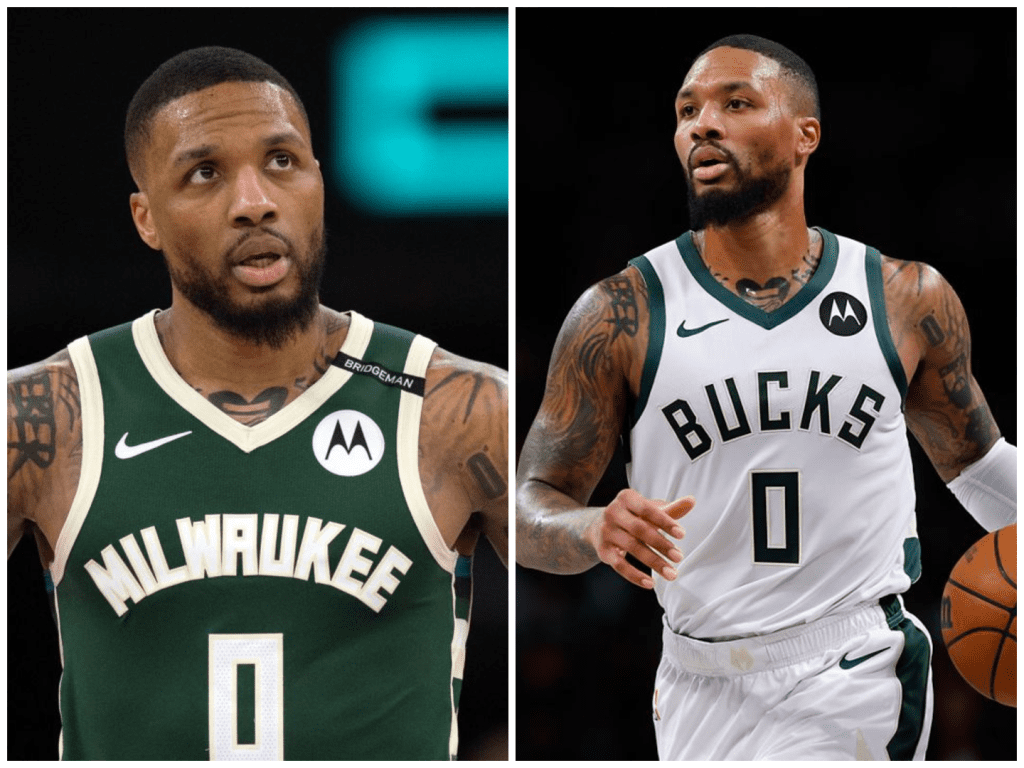The Truth Behind NBA Contract Logic: How Kyrie Irving Got Extended While Damian Lillard Got Waived, and Why None of It Makes Sense Anymore

The NBA doesn’t run on feelings. It doesn’t reward loyalty, consistency, or even logic sometimes. It runs on branding, headlines, fan engagement, and unpredictable decisions that make you question what the league really values. That was never more obvious than the week news dropped that Kyrie Irving, despite suffering a serious injury, got a three-year contract extension — while Damian Lillard, one of the most consistent and loyal players of the last decade, was reportedly waived.
The moment you hear it, it doesn’t make sense. Kyrie Irving, known as much for his off-court drama as for his dazzling handles and shot-making, gets an extension after tearing his ACL. Lillard, the guy who bled for Portland, stuck around when others would’ve left, and still plays at a high level, gets waived. The timeline feels like a fever dream. But here’s the catch: it doesn’t need to make sense. Because the NBA has long since moved past being just a basketball league. It’s an entertainment engine. It’s a brand. It’s a content machine.
Let’s be clear about this part: Kyrie Irving didn’t just randomly get rewarded for being injured. His extension was likely tied to the belief that when healthy, he’s still one of the most dangerous offensive players in the league. Before his injury, he was putting up elite numbers for Dallas and showing signs of chemistry with Luka Doncic. The Mavericks believe they have a window, and locking in Kyrie — even through rehab — is their gamble. That’s not unheard of. Teams often sign injured stars if they believe they can bounce back stronger. But the real debate isn’t about whether Kyrie “deserves” it. It’s about the emotional whiplash fans get when they see that kind of faith placed in him, while players like Lillard — who have built their careers on professionalism and loyalty — are tossed aside.
Damian Lillard didn’t just show up and score points. He gave Portland a basketball identity for over a decade. He hit clutch shots, repped the city in every interview, and stayed loyal during the tank years, the no-defense years, and the “we almost made it” years. He turned down superteams. He turned down drama. He kept believing. And even when he asked to leave, he didn’t blow things up on the way out. He handled it like a pro. The Bucks acquiring him was supposed to be his golden opportunity — a last run with a championship-caliber teammate in Giannis Antetokounmpo. But even that turned sour fast. A coaching change. Chemistry issues. A season that fizzled out in the playoffs. Then comes the news that Lillard might be waived — the kind of quiet, business-first move that strips away years of history like they never mattered.

Here’s the truth most fans don’t want to face: in the modern NBA, player value is not about what you gave — it’s about what you bring right now. Not who you were. Not what you represented. Just what you deliver in the present moment, and whether your narrative still sells. Kyrie, despite everything, still excites people. His name trends. His highlights go viral. There’s always a sense of “what if” with him. That sells jerseys and tickets. Lillard, by contrast, is the finished product. A known quantity. A guy who, unless he’s dropping 50, rarely makes headlines. He’s respected, not obsessed over. Revered, not chased.
Franchises know that. They understand media cycles better than ever. Players like Kyrie are polarizing — but that polarization is valuable. It keeps the story going. Players like Lillard are safe — and sadly, that safety sometimes fades into the background. The result? A league where chaotic talent is often rewarded more than consistent greatness. A league where injury doesn’t stop a deal, but fading spotlight does.
There’s also the salary cap angle. Kyrie’s deal, reportedly backloaded or incentive-based, might not hurt Dallas as much as it seems. Meanwhile, the Bucks are in a tight financial spot, and waiving Lillard could be a cap strategy — not a statement on his talent. But again, fans don’t feel salary cap math. They feel disrespect. And that’s what this all comes down to. A player’s value is no longer just defined by their game — it’s the sum of their media presence, injury history, team fit, salary number, off-court reputation, and yes, even clickability.

What makes it all feel even more backwards is that fans are taught to believe in the opposite. We’re told the NBA is a brotherhood. That loyalty matters. That doing things “the right way” gets rewarded. But when we see Damian Lillard, the face of loyalty, get unceremoniously waived while an injured Kyrie gets paid, that belief gets shattered. It’s like pulling back the curtain and realizing the game you love is being run by an algorithm — one that’s not designed for fairness, but for headlines.
It’s not that Kyrie didn’t earn his money — when healthy, he absolutely does. And it’s not that Lillard is washed — far from it. It’s the contrast that stings. The timing. The symbolism. It’s how these decisions, when put side by side, paint a picture of a league that doesn’t always match its message. A league that says “loyalty matters” until it doesn’t. A league that rewards chaos if it draws attention, and quietly moves on from stability when it doesn’t.
None of this is new. We’ve seen it before. Isaiah Thomas gave his heart to Boston and was traded. DeMar DeRozan was the face of Toronto until he wasn’t. Vince Carter, Allen Iverson, even Dwyane Wade — legends all — left teams that once worshipped them. The NBA is ruthless. But in 2024, it feels more exposed. Social media makes everything faster. Fans catch everything. And the emotional impact of these moves hits harder when it plays out in real-time on your timeline.
So what do we do with all this? Do we stop believing in loyalty? Do we stop investing in players and pretending they’ll retire with one team? Maybe not. But we watch with open eyes now. We know what the game is. We know it’s not always fair. And maybe, just maybe, we respect players like Lillard even more — because they played it the right way even when the system didn’t reward them for it.
Kyrie Irving’s extension might turn out to be a brilliant move. Lillard might land somewhere else and light the league on fire. But this week, the contrast between those two stories was loud. And it reminded us that the NBA doesn’t just break ankles — it breaks hearts too.